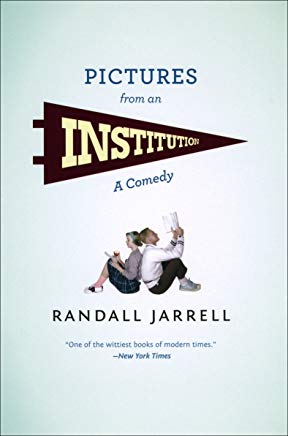Good Reads meta-data is 286 pages, rated 3.59 by 393 litizens.
Genre: Novel set in the academy, so an academic novel

Verdict: Malice aforethought.
A series of picture post cards of the people and their activities in a progressive women’s college in the uplands. Benton College is populated by administrators, professors, spouses, children, and even some students who in the conscientious and self-conscious spirit of the times improve each other. All are observed by Gertrude, a neurotic and vitriolic New York City novelist, spending a semester as writer in residence (while collecting material for her next unsuccessful sarcastic study of the human condition), while she herself is observed by the narrator.
There is no plot and nothing happens as the academic year passes from the faculty reception in the fall and yet I kept reading. The incidents and types are so familiar, from the earnest college President who spends all his time raising money with a beneficent smile, encouraging everyone to call him by his first name, Dwight. Then there is his South African-born Boer wife who seem his antithesis: dislikes anyone and everyone and communicates that by looks, silences, and now and then word.
Some professors have attained their high position because no one has ever understood anything they have said, such is the thickness of the Viennese accents. Others are such relentless do-gooders that it surpasses belief. All peaked at the PhD which left them depleted and fit only for this backwater in the eyes of the aforementioned novelist. Well, one had published a review in ‘Dial’ in 1929.
Then there are the obligatory dinner parties among faculty members who revile each other but affect bonhomie to grease the wheels of life. No sooner have the guests arrived than everyone wishes they could leave but they cannot. There is no ‘Who is afraid of Virginia Wolfe’ drama, only a well rehearsed dance of words that pass the time slowly.
The haughty novelist is a stand-in for Mary McCarthy who had published ‘The Groves of Academe’ (1952) after being a writer in residence at Sarah Lawrence College. I have read it long ago without recollection.
What follows are some examples of Jarrell’s prose filleting. Since she is the centre of attention, we start with Gertrude:
She would have come from Paradise and complained to God that the apple wasn’t a Winesap at all. Page 9
For her mankind existed to be put in its place. Page 13
She looked at me the way you’d look at a chessman if it made its own move. Page 36
“That beige snake,” “that—that soulless woman,” as her two last best friends had called her. Page 74
Her mien was one of impatient astonishment at the stupidity of the world. Page 95
Malice lived in Gertrude as though in nutrient broth. Page 133
The Viennese music teacher’s speech’ was a pilgrimage toward some lingua franca of the far future.’ Page 13.
But he is given many bons mots, e.g., ‘De devil soldt me his soul.’ Page 136. Said to explain the ease with which he composed tunes for all occasions.
Benton College and its progressive education gets the knife, too.
While the faculty members indulged the students to the Nth degree, there was one allowance they never under any circumstances made—that the students might be right about something, and they wrong. Page 81
Education, to them (the teachers), was a psychiatric process. Page 82
The faculty at Benton longed for men to be discovered on the moon, so that they could show that they weren’t prejudiced towards moon men. Page 104
To get an A the student had to believe what her professors believed. They had to make up their own minds, true, but only when their own minds matched those of the professors were they educated. If they thought they had made up their own minds and it diverged from the Benton way, then they were in for more more study conferences, more careful and patient understanding, more mutual improvement, until that Day of Grace came. Page 105-6.
These stabs and others are brilliant, however, there is much dross as the book goes on and on and on. I did flick Kindle pages to the end, a tribute to dedication.
Jarrell made a name as a poet and a critic, and was famed for his barbed aperçus such are on display above. ‘Display’ is the right word because this a demonstration more than a novel. It demonstrates his many talents to make a cloud of words out of nothing at all. In this way it is rather like the pastiche of a middling Woody Allen film. There is much verbiage signifying nothing; it ends on page 236 because he stopped typing, not because of any conclusion. His poetry is spare and terse, but not this garrulous prose.

Jarrell’s most famous poem is the five-line ‘The Death of the Ball Turret Gunner.’ Jarrell had served in the Army Air Corps during World War II. Many of his poems concerns army life and the fears and hopes of draftees, like ‘Eighth Air Force,’ ‘Gunner,’ ‘Mail Call,’ ‘Hope,’ ‘Losses,’ and more. He himself had volunteered. He survived the war to be killed in a car accident crossing the street.
